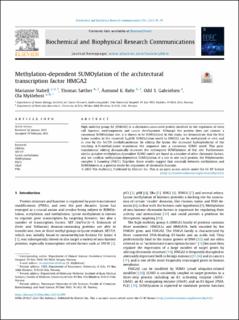Methylation-dependent SUMOylation of the architectural transcription factor HMGA2
Peer reviewed, Journal article
Published version
Permanent lenke
https://hdl.handle.net/11250/2735002Utgivelsesdato
2021Metadata
Vis full innførselSamlinger
Originalversjon
Biochemical and Biophysical Research Communications - BBRC. 2021, 552, 91-97. https://doi.org/10.1016/j.bbrc.2021.02.099Sammendrag
High mobility group A2 (HMGA2) is a chromatin-associated protein involved in the regulation of stem cell function, embryogenesis and cancer development. Although the protein does not contain a consensus SUMOylation site, it is shown to be SUMOylated. In this study, we demonstrate that the first lysine residue in the reported K66KAE SUMOylation motif in HMGA2 can be methylated in vitro and in vivo by the Set7/9 methyltransferase. By editing the lysine, the increased hydrophobicity of the resulting 6-N-methyl-lysine transforms the sequence into a consensus SUMO motif. This post-translational editing dramatically increases the subsequent SUMOylation of this site. Furthermore, similar putative methylation-dependent SUMO motifs are found in a number of other chromatin factors, and we confirm methylation-dependent SUMOylation of a site in one such protein, the Polyhomeotic complex 1 homolog (PHC1). Together, these results suggest that crosstalk between methylation and SUMOylation is a general mode for regulation of chromatin function.

